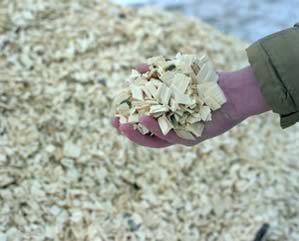60MW biomass power plant for Kokstad, South Africa
 News of the establishment of a 1.2 billion rand (€122/US$154 million) plywood production plant that simultaneously works as a biomass power plant fed by wood residues, has been greeted with jubilation by the mayor of Kokstad, Mbulelo Sithole. The integrated plant is being built by a partnership between Hans Merensky and the Spanish-based Finsa group.
News of the establishment of a 1.2 billion rand (€122/US$154 million) plywood production plant that simultaneously works as a biomass power plant fed by wood residues, has been greeted with jubilation by the mayor of Kokstad, Mbulelo Sithole. The integrated plant is being built by a partnership between Hans Merensky and the Spanish-based Finsa group.Sithole said that there was great excitement about the creation of direct and indirect jobs that the project would bring. "We are overwhelmed, so honoured and very happy." He said the plant would not only improve the economy of Kokstad but that of surrounding areas too.
Sithole said getting the plant approved and negotiations between the municipality and the investors had gone smoothly. His only concern was a lack of accommodation in the area.
"We need more accommodation, but hopefully this will now trigger the building of more houses," he said. Work on the hi-tech plywood plant begins with a sod-turning ceremony at the construction site on Wednesday, when the civil and bulk earthworks contractors start work. Known as HM Kokstad, the plant will boast state-of-the-art plywood processing technology previously unknown in the country. Piet van Zyl, Executive Manager at Hans Merensky, said that locals were hailing this as the "best investment to happen in Kokstad in the last 20 years".
"Development on HM Kokstad will span four phases, which reach completion in 2010 and will create approximately 600 permanent jobs," Van Zyl said. "Approximately 23 000m3 of plywood is expected to be produced a year.
"The plant will be in operation by March 2007. Phase two of the project involves the establishment of a bio-energy plant, which will consume bio-waste including forest waste, pine bark and sawdust, and convert it to electrical power. The bioenergy plant will have the capacity to generate approximately 60 megawatts of heat energy.
"HM Kokstad will use 20 megawatts of the electrical energy, the surplus being made available for the national grid." The biomass plant is expected to be operational in 2008:
 biomass :: bioenergy :: biofuels :: energy :: sustainability :: wood waste :: South Africa ::
biomass :: bioenergy :: biofuels :: energy :: sustainability :: wood waste :: South Africa :: "Also planned for start-up in 2008 is a sawmill and timber yard designed to process 600 000m3 of timber per annum.
"This phase of the development includes construction of a treatment plant to provide treated timber to the market. The final phase of the project, planned for completion in 2010, is the construction of a medium-density fibre board plant, which will cover an area of approximately 7ha.
"As part of phase four, the plywood plant is to be extended to include a veneer plant, which will produce high quality veneer wood products for the market," he said.
Van Zyl said HM Kokstad was committed to serving the best interests of the Kokstad community and had agreed to the necessity of traffic management, pedestrian protection and control measures at the site during a tribunal approval hearing held in the area recently.
The company had also pledged to employ as many local residents as possible and hoped to make use of local business to supply construction and other development needs.
HM Kokstad Project Manager Kobus Visser said where local companies were able to meet the demand and required specifications they would "certainly be given preference".
"An investment of this nature can only benefit the Greater Kokstad Municipality, contributing to poverty alleviation, uplifting the area and stimulating housing and other sectors of the local economy. Training and development of staff will also be a focal point as state-of-the-art technology is being utilised across all phases of the development," said Van Zyl.
The Mercury, via IOL: R1.2bn hi-tech plant for Kokstad, - Sept. 29, 2007
 -------------------
-------------------
 Spanish company Ferry Group is to invest €42/US$55.2 million in a project for the production of biomass fuel pellets in Bulgaria.
The 3-year project consists of establishing plantations of paulownia trees near the city of Tran. Paulownia is a fast-growing tree used for the commercial production of fuel pellets.
Spanish company Ferry Group is to invest €42/US$55.2 million in a project for the production of biomass fuel pellets in Bulgaria.
The 3-year project consists of establishing plantations of paulownia trees near the city of Tran. Paulownia is a fast-growing tree used for the commercial production of fuel pellets.









0 Comments:
Post a Comment
Links to this post:
Create a Link
<< Home